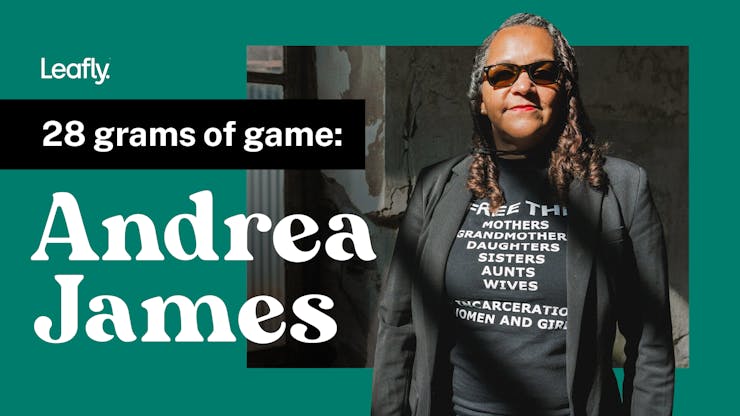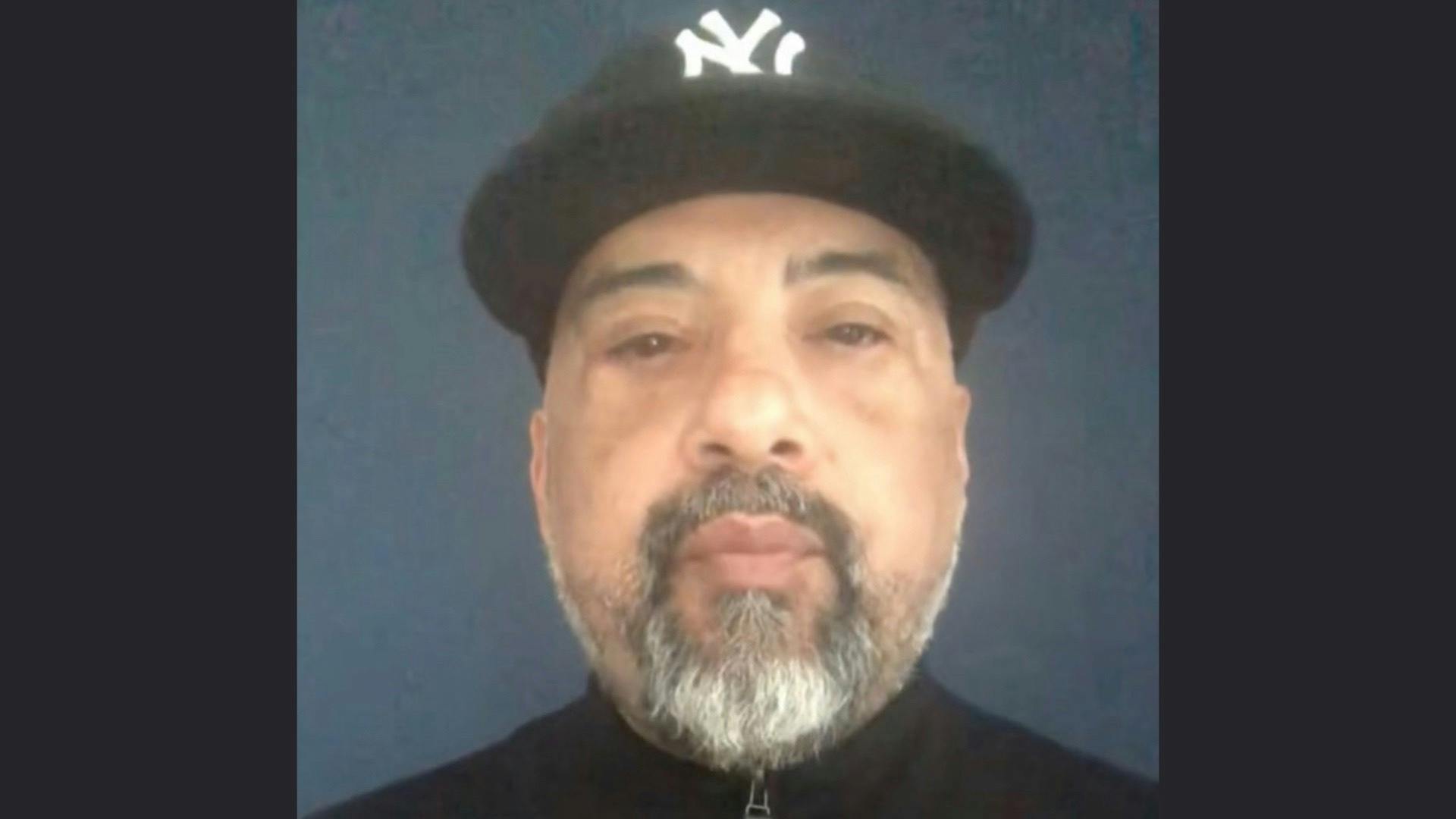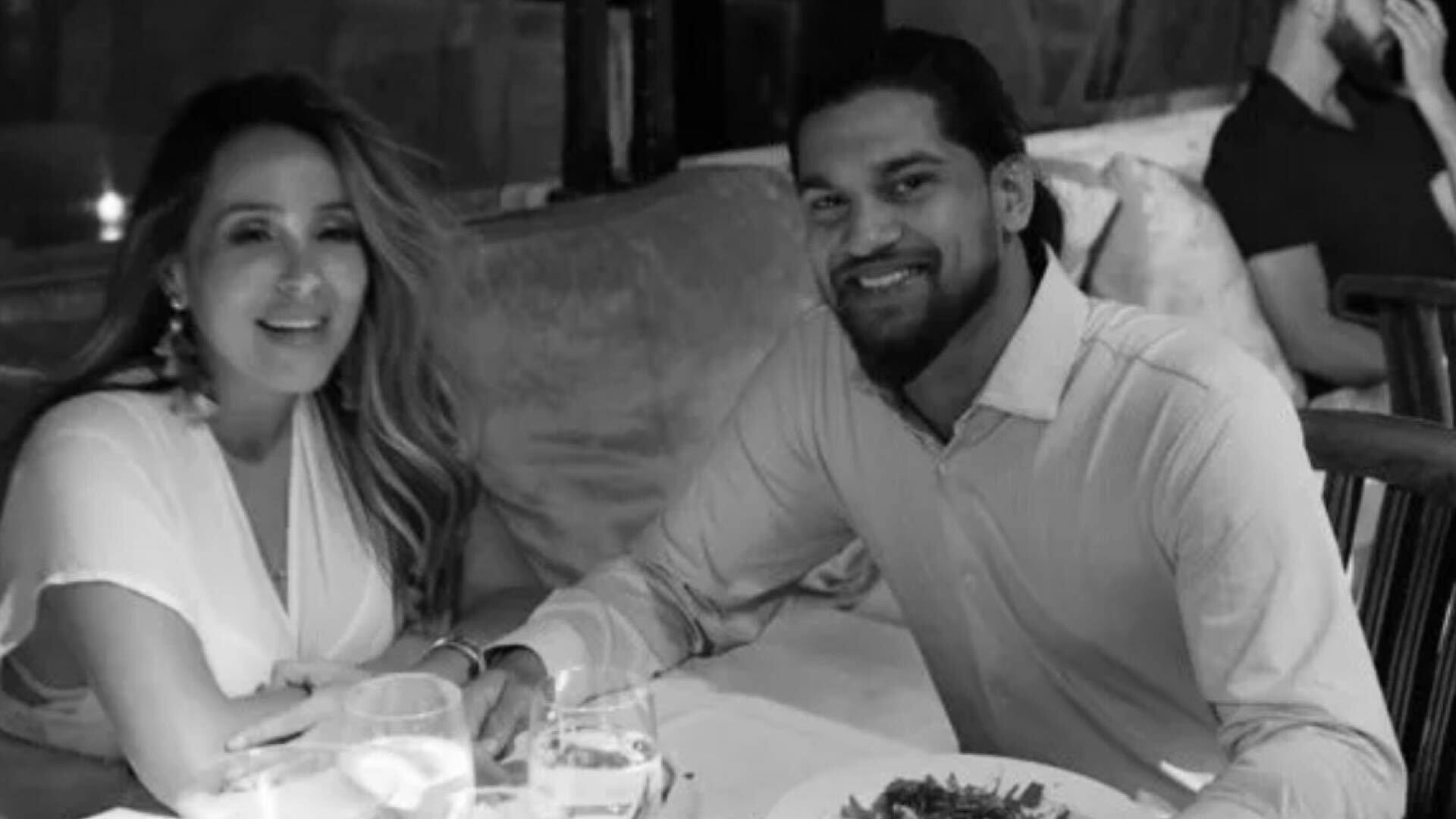Here’s how James went from prisoner to freedom fighter, and how you can join the #FreeHer campaign to release 100 women now
Activist and former attorney Andrea C. James fights for incarcerated women. As executive director of the National Council for Incarcerated and Formerly Incarcerated Women and Girls, she is taking on America’s prison industrial complex from the ground floor.
Her work specifically supports the women and girls often counted out as casualties of a broken system. She also advocates for cannabis prisoners, and a general overhaul of America’s approach criminal justice and rehabilitation.
“Standing in countless courtrooms defending Black and brown people against this system, and then becoming an incarcerated woman myself, I bring a very unique perspective,” James told me earlier this year.
In the 28 grams of game list below, trace James’ unique path from defense attorney, to federal prisoner, to activist responsible for commuting dozens of sentences. Like Leafly, and the rest of the cannabis industry, Andrea demands that all prisoners of the plant be freed and forgiven, now.
Click here to learn how to support James’ #FreeHer campaign to release 100 women.
1. Use your voice
The first thing you notice when listening to Andrea James speak is her bold Boston accent. You can’t fake those northeastern vowels. They tell that her teeth were cut working for the people of Massachusetts as a criminal defense and real estate attorney.
Seasoned by the courts, and her own two-year federal sentence, James’ voice is now a beautiful weapon protecting prisoners in the 25-plus years she’s spent navigating almost every side of the criminal justice system.

2. Don’t forget your roots
James grew up on Boston streets that were nicknamed “million dollar blocks.” The name wasn’t inspired by the property value or gross annual income of residents. But the flood of fast money that hit the streets as the Drug War took off.
Now, many of the big money players that ran those blocks are dead, or behind bars. But James was there to witness the conditions that fueled their ambition. And remains dedicated to changing those circumstances permanently for future generations.
Shop highly rated dispensaries near you
Showing you dispensaries near3. Follow your instincts
It all started when Andrea was a young child, organizing around neighborhood causes. Her passion for serving the underserved made her career as a defense attorney both emotionally taxing, and rewarding.
But even as an accomplished lawyer, she was mostly powerless against the massive systems she was fighting.
4. Expect the unexpected
“We never imagine that it will happen to us,” wrote James of her own stint in prison in for a 2017 TIME spotlight.
“I didn’t either — until I ended up in the same Connecticut prison (as Netflix’ Orange is the New Black) because of one mistake in judgment. I was a criminal defense and real estate conveyance attorney in Roxbury, Massachusetts. In 2010, I was sentenced to serve a two-year federal prison sentence for wire fraud.”
5. Adjust to new challenges
James left behind an entire family and life, including adult children, a 12-year-old daughter, and a 5-month-old son, who was still breastfeeding when she was sent away.
“I was warehoused with over 200 other women, crammed side-by-side in bunks piled on top of each other,” she remembers. “There was no privacy,” as male officers walked freely around our “living” areas, including bathrooms and showers. But she didn’t give in to the soul-crushing conditions.
6. Rise above bad breaks
James remembers her treatment behind bars as subhuman. She describes an “unhealthy environment I never adjusted to” where inmates faced constant “scorn and rebuke” from the entire staff, regardless of what they were in for.
“Our living spaces smelled of fecal matter, and we had to live with inadequate feminine hygiene products,” James said of her time at the Federal Correctional Institution in Danbury, Connecticut.

7. Accept the consequences
A federal court sentenced James to three years of supervised release, and ordered her to pay restitution of $1,141,861.22 for her crime. She fought the charge, citing years of work assisting disadvantaged communities, and saying that her actions were motivated by the misguided goal of helping victims of predatory lenders.
Her evidence was seen as compelling by the court, but not mitigating to her charges, or her disbarment from practicing law. James accepted that her coveted legal career was over and set out on path of rebirth and redemption.
8. Train for the mental marathon
Running helped James regain her mental and physical health while in prison. She didn’t realize it then, but the long distance jogs helped prepare her mind and body for an epic comeback.
“As an outlet for the pain of being separated from my family, I used the outdoor track to run five miles a day. Without that daily run, I could have easily ended up in the long pill line. More than half of the women incarcerated take some form of psychotropic medication during their time behind bars (that’s compared to only 20% of male prisoners.) During my mental saving jogs, I would listen to my commissary-purchased radio and would hear that many media outlets were finally discussing mass incarceration.”
Andrea C. James, TIME, 2017
9. Get to the root of the problem
As she prepared to leave prison, James started to hear more national conversations about mass incarceration on her personal radio. It gave her hope, but also frustrated her.
“They were missing the point,” she said. Pundits were only talking about the Drug War and how the US has the highest incarceration rate in the world. But nobody was giving the graphic details she saw incarcerated women dealing with every day.
She saw abuse, health challenges, and total apathy from the system that inflicted it. James refers to them as the “survived and punished.”

10. Lead the conversation
While Orange is the New Black and other pop culture made the conversation en vogue, few people really wanted to go beyond the surface. James wanted the world to address why women’s incarceration rates have been skyrocketing for nearly a decade in the US.
And she wanted answers for the repulsive physical and mental conditions she and other prisoners faced in a federal facility intended to rehabilitate.
11. Do something, anything
James channeled her frustration into community building behind the wall. “My sisters inside and I decided that we wanted to do something,” James remembers.
“In the prison yard (in 2010), we created and held the first meeting of Families for Justice as Healing (FJAH), with the goal to raise public awareness of women as the fastest growing incarceration population and to use our voices to create a more accurate portrait of who we are, what we had learned and what we could contribute to this dialogue.”
11. Stick to the script
After her release, James continues to lead the group’s work in Boston and nationally through the National Council For Incarcerated and Formerly Incarcerated Women and Girls. “We work to end incarceration of women and girls and to shift from a criminal legal system focused on punishment, to a system based on human justice.”
“There was a lot happening in this country,” James told me this year. “There was an uptick in dialogue around the need to end what they referred to then as mass incarceration.
12. Study the game
The new dialog about mass incarceration James found upon her “re-entry into society” included Michelle Alexander’s book, The New Jim Crow: The age of mass incarceration and Mass Incarceration in the Age of Colorblindness.
“We also read Ruth Wilson Gilmore’s book, “The Golden Gulag,” she told me.
But to James, none of these books really spoke from or for the voice of incarcerated women like her.
13. Self-determination is key
“The ones in the mountains of Danbury, Connecticut. All of these women had been extracted from their communities and removed, and disappeared from their children, their spouses their partners their parents, mostly from their children and their communities. None of them spoke from the voices us, who were women sitting in the prison. So we were determined to speak for ourselves. “
Andrea C. James to Leafly
14. Challenge yourself to make a change
Nothing any incarcerated individual does justifies the subhuman treatment many receive in private, state, and federal facilities. James already knew that from her time as a criminal defense attorney, protecting individuals from these same circumstances.
But living it herself was an entirely different experience.
“We sat in the prison yard one day, and we threw the gauntlet down and challenged ourselves and said, ‘we’re going to change this, we’re going to bring in the voice of the most directly affected women into this conversation,'” James remembers.

15. Stay open to reinvention
After returning home, James continued the work she and her sisters behind the wall started.
Instead of wallowing in the despair of her lost career, she embraced the blessings of returning home. And focused on turning her nightmarish twist of fate into a positive. The pain of her experience, and the knowledge that many other women were still facing those conditions, fueled her every day.
16. Take your issues to the top floor
James’ time as an attorney gave her invaluable knowledge and confidence about navigating the legal and political systems. She quickly connected the dots between her cause, and the Obama administration.
“We worked with President Obama and his Senior Advisor Valerie Jarrett and created a focus on women and incarceration and the need to end it,” James told me. “We went to the White House, we had discussions and were responsible for helping 50 of the 102 women who were commuted.”
17. Speak truth to power
We expected that President Biden would stay true to (his) promises,” James told me of her disappointment with the President. “Criminal justice reform was part of his platform. We haven’t seen any of these things,” she says, frustrated. But her organization responded to his inaction by launching the “100 Women in 100 days” campaign.
18. Set clear goals
To give Biden clear action steps, “we put 100 names of women from the federal system, who he has immediate control with a stroke of the pen.”
James explains her urgency by focusing on the human element of a struggle that’s often faceless: “These women are elderly, they’re sick, they have terminal illnesses, they’re long-timers, meaning they’ve been in prison for more than 10 years. They are victims of domestic and sexual violence. With a stroke of the pen, President Biden could provide them with the justice the relief that they deserve, and we haven’t gotten one out yet.”
19. Know your worth
Going from being a licensed attorney to a convicted felon is a dramatic turn for anyone. But James didn’t let her new reality change her self-worth. She used her rare experience on both sides of the system to create solutions. Breaking buzz words down to their core meaning and finding the numbers that told the true story.
20. Do the math
By James’ calculations, America’s incarceration problem costs society far more than the “$100,000 plus in annual tax payer dollars it costs to incarcerate a woman.” She is also counting the millions of dollars of fallout that comes from separating women from their children and families. Fallout she experienced and saw herself far too many times.
A #FreeHer video explains that women are the fastest-growing segment of the prison population, and that the US is responsible for 30% of world’s women in prison, despite only having 5% of the global population. James drops these and other eye-opening figures regularly to remind people of the scale of this current problem.
21. Aim high
The National Council’s “Free Her” campaign aims to close women’s jails and prisons and to reallocate that funding into the lives of women most directly affected by the prison system and their communities. That may sound extreme, but if you’ve seen the things she’s seen, it would be a no-brainer.
“We have an entire infrastructure that’s built around policy, legal movement, lawyering policy, and reimagining communities,” James told me of her vision for a better society.
22. Pick your battles
The first fights of James’ national “Free Her” campaign are occurring in the six New England states, out of sight and mind for much of the country. “If you’re living in those areas, where you can be a part of helping us to organize in those areas, please, you know, get in touch with us. You can go to our website and find out how to do that at national council.us.”
One of her first battles is to free 65 women that are currently incarcerated in one tiny building sits in the heart of Burlington, Vermont. Then she wants to have that building shut down.
“(We want to) close that women’s prison and create individual exit plans for each of those women, then reallocate (the funds),” she told me. “Some of those (New England) states have women’s prisons with some of the lowest incarceration populations. A few of those states have just one woman’s state prison. So they’re ripe for creating a model of what different looks like.”
23. Change the conversation
Instead of letting dialog delay progress, James is using her verbal prowess to flip the narratives that have normalized mass incarceration for so long.
“We must turn the discussion upside down and instead of focusing on ‘re-entry’ seriously think about what we need to do for ‘no-entry.’ We must acknowledge the centrality of violence and sexual abuse of women and girls, racism, poverty and homophobia as drivers of the criminalization and incarceration of women and girls. If we do not, we will just be tinkering around the edges.”
Andrea C. James to Leafly
24. Free the plant
While practicing law, James saw how weed laws terrorized her clients, who would pay her with whatever they could for protection.
“I stood in countless courtrooms with grandmas from Dudley Street and Orchard Park, bringing me bags of fruit, because they couldn’t afford to pay a lawyer,” James remembers. “Their son or their daughter is already incarcerated, and now their grandbaby just got caught selling a little bag of weed in the park.”
She holds no punches in pointing out the racial and economic dynamics at play. “The War on Drugs was always based on race. They criminalized a plant that has more medicinal value than anything that we have from Big Pharma.”
Weed is now legal in her native Massachusetts, and 35 other states and counting, but James is adamant that there’s still a lot of work ahead. “The federal system is full of people who are still serving life with no parole for marijuana. As people are capitalizing on (legal cannabis).”
25. Change the law, change the world
“When we talk about mass incarceration, people usually refer back to the 1994 Crime Act,” explains James. “It was ushered in by then-President Bill Clinton and current President Biden.
It was one of the most destructive policies that have significantly harmed Black and brown communities in this country, particularly black communities.” But James stresses that a different law is also responsible for the damage she’s seen over the years.

26. Connect the dots
James says: “They don’t pay attention to the thing that most disrupted and destroyed Black families: A large number of currently incarcerated women are the primary caretakers of their children prior to them being placed in prison. The Adoption and Safe Families Act was a policy that was ushered in under the Clinton administration along with the 1994 Crime Act.”
She explains, “that (law) gave a way for a state to adopt these policies where you can create a threshold. If you are considered absent from the lives of your children for 15 out of 24 months they can begin the process of ending your parental rights.”
Few people then or since have considered how destructive this law has been. Or how it all ties back to this nation’s broken legal and political systems. And James doesn’t plan to drop the case anytime soon.
27. Give back to get back
The National Council encourages anyone that supports their work to donate, and spread the word. “It takes a lot of money to do the work that we do. We unapologetically advocate on behalf of women and girls.”
“You also can you can write to the White House,” she adds. “You can send an email, encouraging President Biden to use his clemency power. We cannot do it though without the will of the people. So come in, get on board.”
28. Have the last word in your story
“My experience taught me that incarceration is not the solution for what leads a woman to a prison bunk. Formerly incarcerated women must be in the lead for meaningful reform to be accomplished. That’s how we create the dramatic change that needs to happen.”







